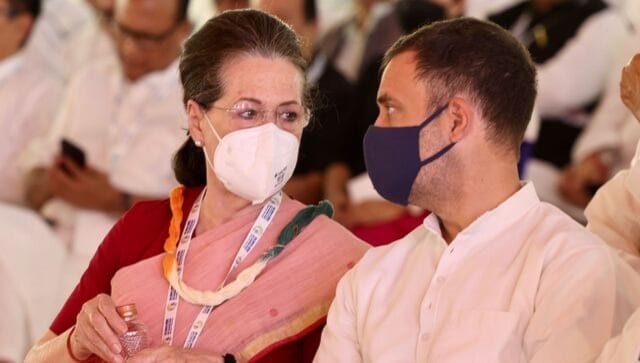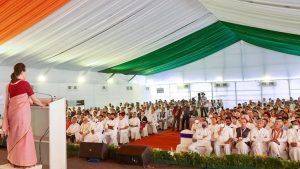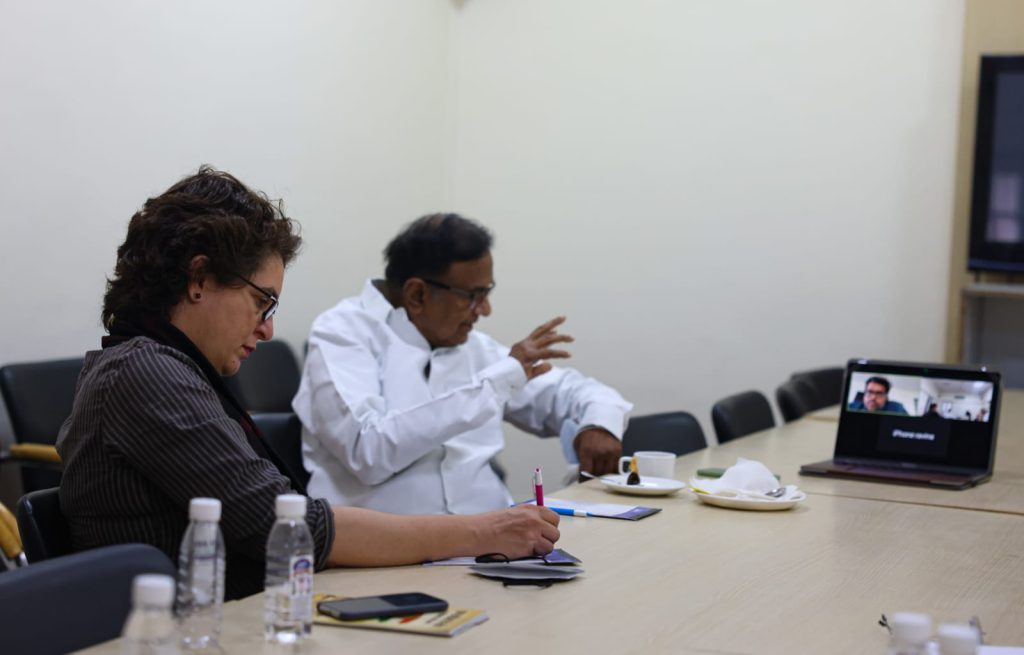
Can Sonia's two panels reverse electoral fortunes of Congress? Not likely

A week after her colleagues huddled together at Udaipur to draw out a blueprint for reforms in the crisis-ridden Congress party, Sonia Gandhi, on Tuesday (May 24), set up two panels with the mandate of assisting her in firming up the party’s narrative on key political issues and to make the electorally atrophying Grand Old Party battle ready for the 2024 Lok Sabha polls.
The idea of setting up the two panels – the Political Affairs Group and the 2024 Task Force – had been endorsed by the interim Congress chief and her colleagues at the party’s three-day Nav Sankalp Chintan Shivir in Udaipur earlier this month.
In her closing remarks at the chintan shivir on May 15, Sonia had said she would set up a Task Force “to drive the process of internal reforms” and that the remit of this group will “cover all aspects of the organisation including structure, rules for appointments to party posts, communications and publicity, outreach, finances and election management”.
She had also spoken about putting in place an “advisory group drawn from the Congress Working Committee (CWC) that would meet regularly under my chairpersonship to discuss and deliberate upon political issues and challenges before our party”.
The mandate of the political group, however, would not be as vast as that of the Task Force as Sonia had made it clear – much to the disappointment of several party seniors who wanted her to agree to forming an empowered Parliamentary Board – that this panel “is not a collective decision-making body but will help me get the benefit of the vast experience of senior colleagues”.
With Sonia now delivering on her promise of constituting the two panels aimed at rebooting and revitalising the party’s political and electoral strategy, the question that many in the party and outside of it are likely to ask is whether the two groups really provide a glide-path for the Congress’s electoral flight against the might of the BJP in the run up to the next general elections.
More so, since the litany of reforms enlisted in the party’s Udaipur Declaration failed to actually inspire any confidence among the Congress’s critics – including several grumbling leaders within the party – who saw the chintan shivir more as the Gandhi family’s bid to deflect attention away from the barrage of attacks it faced over precipitating the continuing electoral tailspin of the GOP.
Unfortunately for the Congress high command, the two panels constituted by Sonia are bound to attract the same criticism that the Udaipur Declaration did and is likely to be branded merely as an exercise on her part to keep dissenters within the ranks from launching another diatribe against her.
 Look at the Political Affairs Group first. Sonia had already made it clear at Udaipur that she was not going to cave in to the demand of reform-seekers in the party – the so-called G-23 – for upholding the Congress constitution by setting up a Parliamentary Board for collective decision-making instead of the present system of the high command ruling through diktats. The role of the group will be purely to advise Sonia.
Look at the Political Affairs Group first. Sonia had already made it clear at Udaipur that she was not going to cave in to the demand of reform-seekers in the party – the so-called G-23 – for upholding the Congress constitution by setting up a Parliamentary Board for collective decision-making instead of the present system of the high command ruling through diktats. The role of the group will be purely to advise Sonia.
With the party already due to elect a new Congress president by August-end, it is unclear whether the current composition of the Political Affairs Group will change if and when Sonia makes way for a full-term party chief – or for that matter, if the group will last beyond August. Those included in the eight-member group are former party chief Rahul Gandhi, senior leaders Ghulam Nabi Azad, Mallikarjun Kharge, Digvijaya Singh, Ambika Soni, Anand Sharma, KC Venugopal and Jitendra Singh.
Of these, Azad and Sharma are leading lights of the G-23. Their long Parliamentary careers notwithstanding, Azad and Sharma’s inclusion in the political affairs group has predictably made headlines not for the political wisdom they bring to the high table but purely as Sonia’s sustained effort at ending their intermittent outbursts against the listlessness of the Congress. Besides, both Azad and Sharma are also lobbying to get re-nominated to the Rajya Sabha when the party announces its candidates for the ongoing biennial elections to fill 57 seats in Parliament’s Upper House, of which the Congress can hope to win a maximum of just 11.
Azad and Sharma had both retired from Parliament’s Upper House earlier this month amid rumours that the high command will not give them another term. Their rants against the party’s repeated electoral failures were invariably linked to their perceived fear of being pushed into political oblivion by the Gandhis – especially Rahul – and it was only over the past month that Sonia renewed her efforts at brokering an armistice with the two veterans. Whether their inclusion in the political affairs group nixes their chance of re-entering the Rajya Sabha is yet unclear.
Also read: Congress’ Udaipur roadmap gets marred by party’s leadership issue
The other members of the group too inspire little confidence. There’s Ambika Soni, an old time Sonia-loyalist who was scorched in the midst of the chintan shivir by the vicious outburst of Sunil Jakhar, former Punjab Congress chief and BJP’s newest recruit.
Kharge’s induction to the group can be attributed to him presently holding the important office of Leader of Opposition in the Rajya Sabha, as well the confidence he enjoys of the Gandhis. The inclusion of Digvijaya Singh – he has also been named as member of another panel constituted by Sonia to coordinate the party’s Kashmir to Kanyakumari Bharat Jodo Yatra that will launch on October 2 – marks his definite return to the hallowed coterie that surrounds the Gandhis. It is a different matter though that the former MP chief minister’s insistence that the party make a visible and sustained outreach to the persecuted Muslim community found few takers at the chintan shivir and that in his own home state of Madhya Pradesh he has been caught in a battle of brinkmanship with old friend-turned-rival Kamal Nath.
And then, there are Venugopal and Jitendra Singh. What these two have accomplished politically to deserve a chair at the high table, besides being confidantes of Rahul Gandhi, remains a mystery even to Congress insiders.
Within the Congress, Venuogopal, the powerful AICC general secretary in-charge of the organisation, has often come under attack for his poor handling of organisational matters and his virtually non-existent skills at winning over sulking leaders – something the late Ahmed Patel used to do with great flair for Sonia till his demise due to COVID in November 2020. Earlier this year, when a Congress leader previously close to Rahul was on his way to join the BJP after months of speculation about his imminent switch, the only intervention Venugopal reportedly made was to send the leader a text message asking if he was indeed joining the BJP. When the leader replied in the affirmative, all that Venugopal did was to reply to him with an “OK”.
Jitendra Singh’s case is even more inscrutable. The scion of the erstwhile Alwar royal family, Jitendra, an AICC general secretary and CWC member, has served as the party’s in-charge for Odisha and is currently in-charge of Assam. It was under his watch, the party registered its worst performance in the 2019 Odisha assembly polls and was similarly routed in the state in the 2019 Lok Sabha polls. Singh was quickly reassigned to Assam where, last year, he convinced the Congress high command of an imminent victory in the assembly polls only to deliver a shocking defeat.
The composition of the 2024 Task Force follows the same pattern of the Congress high command constituting panels tasked with key responsibilities using loyalty of the individual members as the only barometer.

The members of the 2024 Task Force are –P Chidambaram, Priyanka Gandhi Vadra, Mukul Wasnik, Jairam Ramesh, KC Venugopal, Randeep Surjewala, Ajay Maken and Sunil Kanugolu.
Of these members, poll strategist Kanugolu is the only surprise induction. A former aide of Prashant Kishor – talks between the Congress and Kishor over the latter’s induction into the party had failed in April – Kanugolu was roped in to work on the party’s poll strategy for Karnataka earlier this year. With Kishor chalking his own electoral path, the party has evidently decided to bank on Kanugolu to deliver an election-winning strategy. However, the low profile poll strategist, unlike Kishor, is not known for consistently delivering victories – he has worked well for the BJP in the past but his efforts to help the Akali Dal score a victory in the Punjab polls this March had sunk without a trace.
While Chidambaram and Ramesh may be brilliant in giving the party advice on what policies to follow when in government, their competence in drawing up a strategy for electoral revival is, at best, only theoretical. Similarly, while Priyanka may be a far superior orator than her brother and has often been hailed by party apparatchiks as a ‘natural politician’, her misadventures in the recent UP assembly polls, along with a Rahul-esque proclivity for work-from-home and Twitter-happy politics are well known by now.
Wasnik, another G-23 leader, is known to be a good organisation man and was the convenor of the party’s panel that gave suggestions at the chintan shivir for wide-ranging organisational reforms. But does Wasnik, whose own track record of retaining his former Lok Sabha seat of Ramtek in Maharashtra has been patchy, have any effective prescriptions for the Congress’s electoral revival in 2024?
This leaves Surjewala and Maken. Among the key challenges before the Task Force would be to draft a comprehensive communication strategy that can effectively target and counter the BJP. That the Congress’s communication strategy has resoundingly failed to take on the BJP’s media blitzkrieg was a view endorsed overwhelmingly by party leaders at the chintan shivir. The Udaipur Declaration had, in fact, endorsed the need for an overhaul of the “jurisdiction, scope and structure of the media and communication department” of the party. Surjewala happens to be the party’s media cell chief, while Maken held this charge before him and is reportedly eying the position again.
The individual electoral competence – or rather the lack of it – of Surjewala and Maken are also no secret. Both have lost successive elections and Maken continues to draw flak even today from his colleagues in the Congress’s Delhi unit for single-handedly destroying the party’s poll prospects in his allegedly self-serving bid to outshine the late Sheila Dikshit.
These are the two teams that Sonia now wants to bank on to revitalise her crisis-ridden party and reverse its electoral fortunes in the 2024 Lok Sabha polls. The outcome of the exercise may not be hard to imagine.


